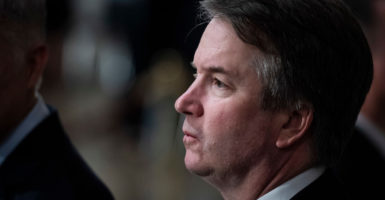George Mason University’s Antonin Scalia Law School recently announced Justice Brett Kavanaugh will teach a class during its summer term on the creation of the Constitution.
Students will travel to Runnymede, England, the location where Magna Carta was sealed more than 800 years ago.
Naturally, this led a student group from the undergraduate university called Mason 4 Survivors to post an apoplectic petition on Change.org demanding the school cut ties with Kavanaugh. Some of these students actually say Kavanaugh’s hiring jeopardizes their safety and happiness.
Some members of the undergraduate university’s Faculty Senate are now calling for the school to independently investigate the claims of sexual assault leveled against Kavanaugh during his confirmation last fall. Apparently the work of the United States Senate and FBI—not to mention the countless news outlets that investigated these claims—was insufficient.
These professors are likely the same malcontents who objected to the university’s decision to rename the law school in honor of the late Justice Antonin Scalia back in 2016.
So far, University President Angel Cabrera has stood by the law school’s decision—supported by the entire law school faculty—to offer this course, pointing out, “The students [at the law school], by the way, have agreed. The students have signed up to this class.”
These calls to “Cancel Kavanaugh” or “Kick Kavanaugh Off Campus” seek to weaponize the #MeToo movement for partisan purposes. Capitulating to them would be a disservice to students at the law school.
I’m a graduate of the Scalia Law School, and I wish I had the opportunity to take even a single course with any sitting Supreme Court justice. In addition to Kavanaugh, students in recent years have had access to two sitting Supreme Court justices as well as countless other federal and Virginia state court judges.
Justice Neil Gorsuch co-teaches two summer courses with his former law clerk and Scalia Law professor Jamil Jaffer in Padua, Italy, on the separation of powers and inter-branch conflicts in national security.
And just a few years ago, Justice Clarence Thomas taught a seminar along with his former clerk and Scalia Law professor Neomi Rao on the history and foundation of the administrative state. The class likely would have continued had President Donald Trump not tapped Rao to head the Office of Information and Regulatory Affairs, and then to be a judge on the powerful U.S. Court of Appeals for the D.C. Circuit (filling the vacancy left when Kavanaugh joined the Supreme Court).
The opportunity for students to learn from and interact with top legal minds, and some of the most powerful judges in our country, is invaluable.
I’m willing to bet it’s not just members of the Scalia Law Federalist Society chapter who rushed to get into these classes. Indeed, I checked with the law school, and the course coordinator confirmed that there was a considerable amount of interest in Kavanaugh’s class. Students had to submit an application for a spot, and the lucky few who have been selected will pay $3,000 to cover travel and lodging, on top of their regular tuition.
Just as I was skeptical of Senate Democrats quickly jumping to conclusions when Christine Ford accused Kavanaugh of sexually assaulting her when they were teenagers, I find these protests about Kavanaugh’s hiring equally dubious.
Sexual assault is a serious issue. Unfounded accusations of sexual assault should not be manipulated for partisan purposes simply because some people are unhappy that Kavanaugh was confirmed to the Supreme Court.
Comments on the Change.org petition, as well as during a recent board of visitors meeting in which students were allowed to voice their concerns, show the real motivation behind this movement. It can be summed up as two things: (1) claims that students are not safe at George Mason University, and (2) complaints about Trump, Republicans, and Kavanaugh’s confirmation generally.
Revealingly, one commenter wrote, “Kavanaugh must GO. And also remove him from the SCOTUS.”
At the board of visitors meeting, one student said, “As someone who has survived sexual assault three times, I do not feel comfortable with someone who has sexual assault allegations … walking on campus.”
It is outlandish to claim Kavanaugh endangers the safety of students at George Mason University. He will teach a course in Runnymede, England, which is separated from the university’s Fairfax, Virginia, campus by more than 3,600 miles and the Atlantic Ocean. Moreover, the law school’s decision to hire Kavanaugh should not be treated as a referendum on his confirmation or a chance to revisit the baseless allegations leveled at him last fall.
The students who chose to apply for the summer course taught by Kavanaugh should be allowed to learn from him. The outrage mob at George Mason’s main campus should not deprive these law students of the once-in-a-lifetime opportunity of interacting with a sitting Supreme Court justice—one of the leading legal minds and most powerful judges in our nation.




























